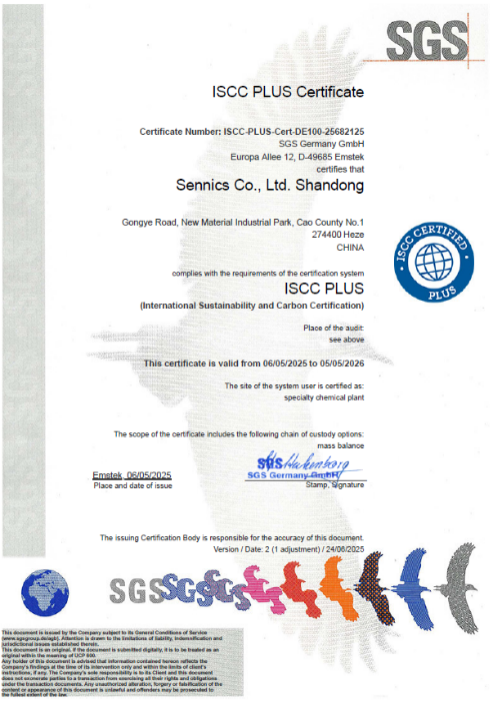Recently, Sennics Shandong officially received an ISCC PLUS certification from SGS, a leading third-party certification body in the world. ISCC stands for International Sustainability & Carbon Certification. ISCC PLUS is a voluntary certification scheme designed to validate sustainability characteristics of alternative raw materials. The ISCC PLUS certification for Sennics Shandong recognizes the company's three key product lines: 6PPD, IPPD, and TMQ. This indicates that the company has built a complete system meeting international standards for the application of sustainable raw materials and for green manufacturing, and has had the ability to supply raw materials containing bio-based materials or bio-based recyclable raw materials for customers.

ISCC PLUS is the leading sustainability & carbon certification scheme in the world. The basis of every ISCC PLUS certification is the use of alternative raw materials, which may be waste and residues, renewable-energy-derived raw materials, sustainably grown agricultural raw materials and forest biomass. Through the Mass Balance Supply Chain Model, Sennics is able to manage the traceability of bio-based raw materials and bio-recyclable raw materials. Based on the quantitative allocation of sustainable attributes, this method can break the physical boundaries to precisely track the characteristics and quantities of sustainable materials in the value chain, ensuring the high quality of products while minimizing resource consumption and environmental impact. Bio-based raw materials are grown following sustainable farming practices, whereas bio-recyclable raw materials are based on the reuse of wastes as resources. They can significantly reduce a product's lifecycle carbon emissions.
Among the three ISCC PLUS-certified products, 6PPD is produced using the company's exclusive process, in which a new precious metal-based catalyst is used to catalyze hydrogenation. This process is characterized by mild reaction conditions, high intrinsic safety, high atom utilization rate, and low consumption of energy and raw materials. The sources of the raw materials are green. The entire production process is completely closed off, continuous, and automated, generating almost no waste. The process received a National Technology Invention Award (Second Prize). It was also included in the Petrochemical Green Processes Directory by China Petroleum and Chemical Industry Federation (CPCIF). TMQ is a differentiated series of products thanks to their green synthesis process. Specifically, S-TMQ was included in the Directories of Technologies and Products Encouraged to Be Popularized and Applied in the Petrochemical Industry by the Ministry of Industry and Information Technology (MIIT), and received a second prize of the CPCIF's Science and Technology Progress Award in 2022 and a second prize of the Shandong Science and Technology Progress Award in 2023. IPPD is a high-performance benzidine-based antioxidant for mitigating aging caused by ozone and fatigue. This product has become one of the mainstream solutions in the global tire industry thanks to its fast migration and exceptional performance in providing early protection.
This certification is an authoritative endorsement of Sennics' sustainable production processes, which are designed to constantly reduce their environmental impact throughout product lifecycles. As a company recognized by the MIIT as the leader in a specific segment of the manufacturing industry, Sennics always follows its philosophy of "In Science We Trust", looking to build a green manufacturing system spanning R&D, production, and services by leveraging its patents granted in China and other countries and by partnering with research bodies. In the future, Sennics will continue to beef up sustainable production and have more products certified by ISCC PLUS. Leveraging its global R&D and manufacturing network, the company will deepen green innovation and manufacture more low-carbon products using sustainable raw materials, to empower downstream customers to meet the requirements of EU carbon tariffs and other regulations, and to drive the sustainable development and upgrade of the rubber additives industry.